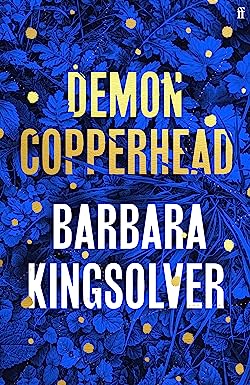A Review of “Demon Copperhead” by Barbara Kingsolver

Ok so let’s cut to the chase. The only real question about this book is, how on earth did it win the Women’s Prize for Fiction? It’s not that it’s bad, it’s just that it’s not good enough. And in a reversal of the old Jewish joke, there’s just far too much of it. It comes in at about 540 pages, and were it to be trimmed to around 400, it would still be baggy, saggy and flabby.
There is a second, supplementary question. Why is it impossible to find a negative review in the whole of cyber space? Or even a luke warm one? After I didn’t finish the book, I trawled the internet for the reviews to see what the literary establishment thought about. And well whadda ya know? They all loved it. Of course they did. I am wearily used to lying firmly outside the mainstream when it comes to opinions about cultural products. The lonely furrow is the one I seem to plough repeatedly. And there is always the problem of reviews done by other writers where an institutional phenomenon of “You scratch my back, I’ll scratch yours” is in rude health. It’s not that I want to be negative about anyone’s work. Writing a novel is a major undertaking and all kudos to anyone who achieves it, but really, let’s not suspend our critical judgement. It’s not a hanging offence to publish something that’s not absolutely wonderful. Let’s actually read the book, and then be truthful about it.
The other possibility, of course, is that I’m just wrong, and that it is, in fact, a major piece of work.
The problem here, the elephant in the room, is Mr Charles Dickens. Kingsolver is on the record professing her deep love and admiration for the Great Man and his works, and her determination to do a modern day version of David Copperfield. All well and good so far. The trouble is she seems to be so intent on her updated homage to her hero that it has elbowed out of the way all other considerations. You know, things like writing a novel that works on its own terms. One that engages, entertains and enlightens. One that leaves you moved by the plight of the protagonist and gives you some insight and empathy into a pressing social issue of the day. Set against that, pulling off a trick of adoring imitation seems a little shallow and pointless.


It’s not as if she didn’t have promising material. Setting the book in rust belt Virginia, looking at Blue Collar poverty and neglect, exploring the opioid addiction crisis of these left behind communities and exposing the seemingly scandalous mess of foster care and adoption in the US – all of these issues are worthy of a big novel. Unfortunately, I have to report that this is a big novel only in the sense of the number of pages it amasses. On all other available measures, it falls short.
To be scrupulously fair, there’s a lot of good writing here. KIngsolver has been around the block a bit and knows how to put together a sequence of well tuned sentences. And there are times in the first half of the novel when it seemed that it was on the verge of lift off, but each time proved to be a false alarm. Hope and expectation, time and time again, are throttled at birth by repetition, relentless accumulation of peripheral characters and scenarios, and an overall sense of meandering.
I wondered whether this was Kingsolver deliberately attempting to be Dickensian, trying to ape his characteristic gallery of grotesques and eccentrics in order to create a world where all human life is here. The trouble is, Dickens does it with great verve and style. Each diversion, when the reader is inducted into the lives of yet another group of oddballs and ne’erdowells, re-energises the novel as a whole. The prose sparks and fizzes, the subplots entertain, the narrative drive of the main plot is undiminished, Maybe it’s his skill at the episodic nature of monthly installments, where cliffhangers and structure drags the reader forward on a basic mission to find out what happens next. In this case, there is no sense of forward propulsion. Each diversion causes the book to sag. Each set of grim circumstances and terrible characters seem indistinguishable from the previous lot, until the reader starts to actively not give a toss about the fate of our hero. Or, at any rate, this reader didn’t.
It’s not helped by Kingsolver’s use of the first person. The voice of Demon Copperhead, the eponymous hero, (David Copperfield. Come on – keep up) is used throughout the novel. It’s his story, told by him. And it’s brilliantly done. There is an authenticity to it and it adds to the sense of place that Kingsolver achieves. But after a while, I found it rather relentless and rather limited. I wanted to see this world from some different perspectives, to hear another voice.

In the end, you can’t escape Mr Dickens, who is always there, looking over your shoulder as you read. Like Kingsolver, I love Dickens. I’ve read all of the novels and some of his stories. I love the plotting and the prose style and the characters. I love the vastness of them and the pleasure of the language. I love the fact that they are as much about a society at a particular time in history as they are about particular characters and relationships, and that Dickens’ voice and views are never far away. But they are from a very different time, and novels, and people and cultural consumption have changed utterly since Charlie’s heyday. What worked for him and his readership doesn’t really work for us in quite the same way. Dickensian is an adjective often used to describe modern narratives and it’s never used pejoratively, always as a quality kite mark of approval. It’s a go to for reviewers to “place the product”. Zadie Smith’s debut, White Teeth, gets the tag, partly for its London setting I suspect, partly for its teeming cast of characters, partly for its exuberance. My own novel, “Zero Tolerance” saw me dubbed as the “Edu Dickens of his generation” in one memorable review. I always feared that was a nod to the fact that it was too long, a little boring in parts and full of improbable coincidences. But enough of me, as no novelist ever said, ever.
Really, when you get down to it, the only person who does “Dickensian” well is, er , the man himself. But I do think this explains the prize winning. Just like any moderately famous actor who does a film playing someone with autism, or a mental health condition, or impersonates someone famous in a biopic becomes a shoo in for an Oscar, so a writer who tries to parallel a famous Dickens novel is aiming for the glittering prizes. Every parallel, every witty updating, every character name spotted by the discerning reader, each of these things generates more brownie points in the pot. We do love a writer who can help us feel a bit cleverer than we usually are.
Personally, I prefer a writer who writes a novel that grips and intrigues and excites and enlightens. A novel that I can’t put down, to take refuge in a familiar cliche.
“Demon Copperhead”, unfortunately, was a novel that I couldn’t stop putting down.
